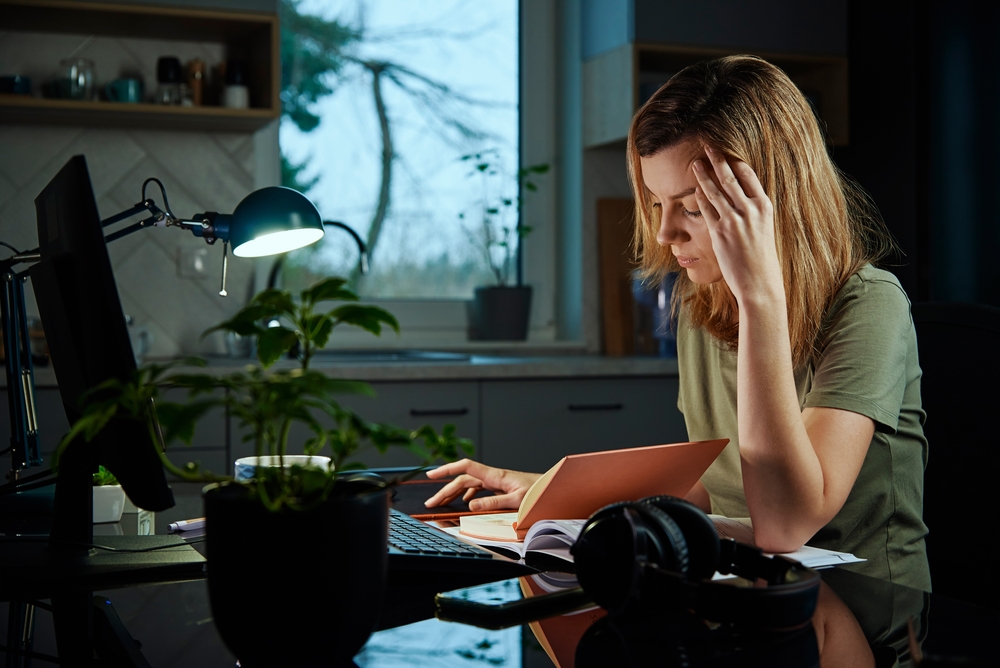What’s included?
- Introduction
- How has COVID-19 changed the way we work?
- What is the psychological toll of COVID-19?
- Does remote working increase stress, isolation and burnout?
- Protecting your mental health post-COVID-19
- How can Delamere help with stress, isolation and burnout?
- References
The COVID-19 pandemic changed the way we work forever. Office workers suddenly found their desk was the kitchen table. Service industry workers were either out of a job or forced to retrain. Already stressed healthcare professionals were stretched to the brink of their mental and physical capacity. It was unprecedented.
And while some were happy that their daily commute was now a short trip downstairs, many found the whole magnitude of change overbearing. Not only was there financial stress to contend with, but the isolation of home working and social distancing, the worry of becoming seriously ill, relationship breakdown and uncertainty surrounding the future.
In many ways it felt like being trapped in an awful horror movie with no means of escape. Which, even for the most resilient among us, is bound to seriously impact our mental health. Here, we look at the psychological toll of COVID-19 and how the pandemic may have contributed to work stress, isolation and work burnout.

Need help managing work stress? Speak to Delamere
How has COVID-19 changed the way we work?
No industry has been left unaffected by the pandemic. Different working hours, a changing workforce, new challenges, expectations and financial implications – the effects have been felt across all sectors.
Number of meetings up by 13%
According to a recent study, for remote workers COVID-19 has meant more time spent in virtual meetings, a greater reliance on email and longer working days, as the line between office hours and home-time has become blurred.
72% of people prefer hybrid working
Many organisations have moved to a hybrid way of working including a few days in the office to balance out social interaction and work culture with the benefits of more time spent at home. Slack is one of the productivity platforms facilitating this move. Their research found 72% of workers now favour a hybrid model.
9 million people have changed jobs
Let’s not forget the people who can’t work remotely. The cleaners, service workers, retail assistants, taxi drivers, beauticians. During the pandemic, and in the immediate aftermath, many were forced out of their roles or left with no choice but to diversify their businesses. In itself, extremely stressful.
1 in 10 nurses left the profession in 2021
Hardest hit were our wonderful medical professionals. During the second year of the COVID-19 pandemic a higher proportion of nurses and consultants left the NHS. Those citing work-life balance and health for reasons to quit have quadrupled over the last decade, fuelled by exhaustion, stress and burnout. (1)
What is the psychological toll of COVID-19?
Now that the working landscape has changed, what does this mean for our workers? Are the new conditions since COVID-19 contributing to an increase in stress, isolation and burnout or have we become more resilient in the face of adversity?
COVID sufferers at increased risk of PTSD
Studies show many people who recovered from COVID-19 suffer with PTSD. This causes them to have distressing thoughts and feelings which can impact their role in the workplace. Employees with PTSD may struggle with their emotions, lose their ability to focus and underperform. After the pandemic, around one fifth of employees were at risk of developing PTSD. (2)
Poor working arrangements fuel isolation
While flexible working conditions help people to develop better work/life balance, this can be offset by social isolation if conditions aren’t properly managed by employers. Social isolation, or loneliness, can arise from a lack of professional contact, whether it’s having a chat around the water cooler or integrating in team tasks. Isolation is closely linked to anxiety and depression, leading to employees becoming withdrawn and demotivated.
50% of employees have experienced burnout
Changes in people’s roles have also contributed to burnout. Taking on the pressures of a new job, trying to launch a new business and working longer hours at home are the main culprits. A 2022 survey of remote workers revealed 50% of UK employees had experienced at least one symptom of burnout due to lack of social interaction and the fizzling of boundaries between work and home. (3)
Stress resilience and mental health
By spring 2021, over 156 million confirmed cases of COVID-19 and more than 3.2 million deaths had been reported leading to over 5,000 papers on the impact of the pandemic on mental health and stress resilience.
A critical review of data the following year revealed these insights:
- Cases of stress, anxiety and depression increased in general but particularly amongst vulnerable groups such as pregnant women and the elderly
- People with existing psychological disorders experienced profound negative impacts on their mental health during the pandemic
- Follow-up studies showed stress resilience actually increased following the pandemic as people learned how to react and adapt (2)
While it’s nice to hear some people managed to build their resilience to stress, everyone’s ability to cope is different and depends on their unique neurobiological, psychological and environmental factors.
Does remote working increase stress, isolation and burnout?
Anyone who works remotely will tell you there are pros and cons of working from home. It’s a delicate balance between the joys of spending more time with family and the lack of boundaries and structure that help to keep us grounded. An article by the British Psychological Society published in the wake of the pandemic highlighted these key points:
- People are 13% more productive when they work from home
- Increased productivity fosters social isolation
- Isolation and loneliness increase premature death by 50%
- Your personality has a lot to do with how you handle remote working
- Introverts may feel more anxious and are at increased risk of burnout
- Using new technology can also contribute to work-based stress
- Without mentoring, staff can feel isolated and demotivated
Protecting your mental health post-COVID-19
During the pandemic, the World Health Organisation issued some advice on how to protect mental health for remote workers, much of which is still very relevant today:
Have a routine
Getting up and going to bed at similar times every day, keeping regular mealtimes and exercising regularly – especially outdoors – is beneficial for our mental health.
Maintain social contact
Even if most of your meetings take place over Zoom, try to get out and meet people. It’s good to strike a balance between home and office working.
Watch your alcohol use
It can be easy to turn to drink if you’re socially isolated, stressed or suffering with burnout. If you feel like your alcohol or drug use is out of control, seek help.
Ration your screen time
Without regular scheduled breaks screens can take over our lives. If you’re not on your computer, you’re reaching for your phone. Social media can often be a trigger for mental health issues such as anxiety and depression, so limit your access and keep things light and positive.
How can Delamere help with stress, isolation and burnout?
Work-related stress takes many forms and can manifest itself in a multitude of mental health problems as well as alcohol and drug addiction. Delamere is the only purpose-built wellness retreat in the UK to offer such a comprehensive range of treatments for the psychological impact of stress, isolation and burnout.
We have helped hundreds of people throughout the pandemic and beyond to recognise their problems, develop coping mechanisms and go on to have fulfilling, stress-free lives.

Set in six acres of beautiful forest, Delamere provides the perfect location for our multi-disciplinary team to get to work. You will benefit from a range of evidence-based psychotherapies along with complementary practices including mindfulness, breathwork, yoga, art and equine therapy.
We will help you find out what’s triggering your stress and develop a personal plan to manage your actions and reactions in the workplace. Our goal is to support you emotionally, physically and psychologically to help you have a successful return to work.
If you are concerned about work stress and/or addiction, call us confidentially to speak to a member of the team today.
References
1. Palmer W and Rolewicz L (2022) “The long goodbye? Exploring rates of staff leaving the NHS and social care”, Nuffield Trust explainer.
2. Rodoplu Şahin, D., Aslan, M., Demirkaya, H. et al. The effect of COVID-19 on employees’ mental health. Sci Rep 12, 15067 (2022). https://doi.org/10.1038/s41598-022-18692-w.
3. Deloitte Mental health and employers: the case for investment – pandemic and beyond, March 2022.
4. Manchia M, Gathier AW, Yapici-Eser H, Schmidt MV, de Quervain D, van Amelsvoort T, Bisson JI, Cryan JF, Howes OD, Pinto L, van der Wee NJ, Domschke K, Branchi I, Vinkers CH. The impact of the prolonged COVID-19 pandemic on stress resilience and mental health.






